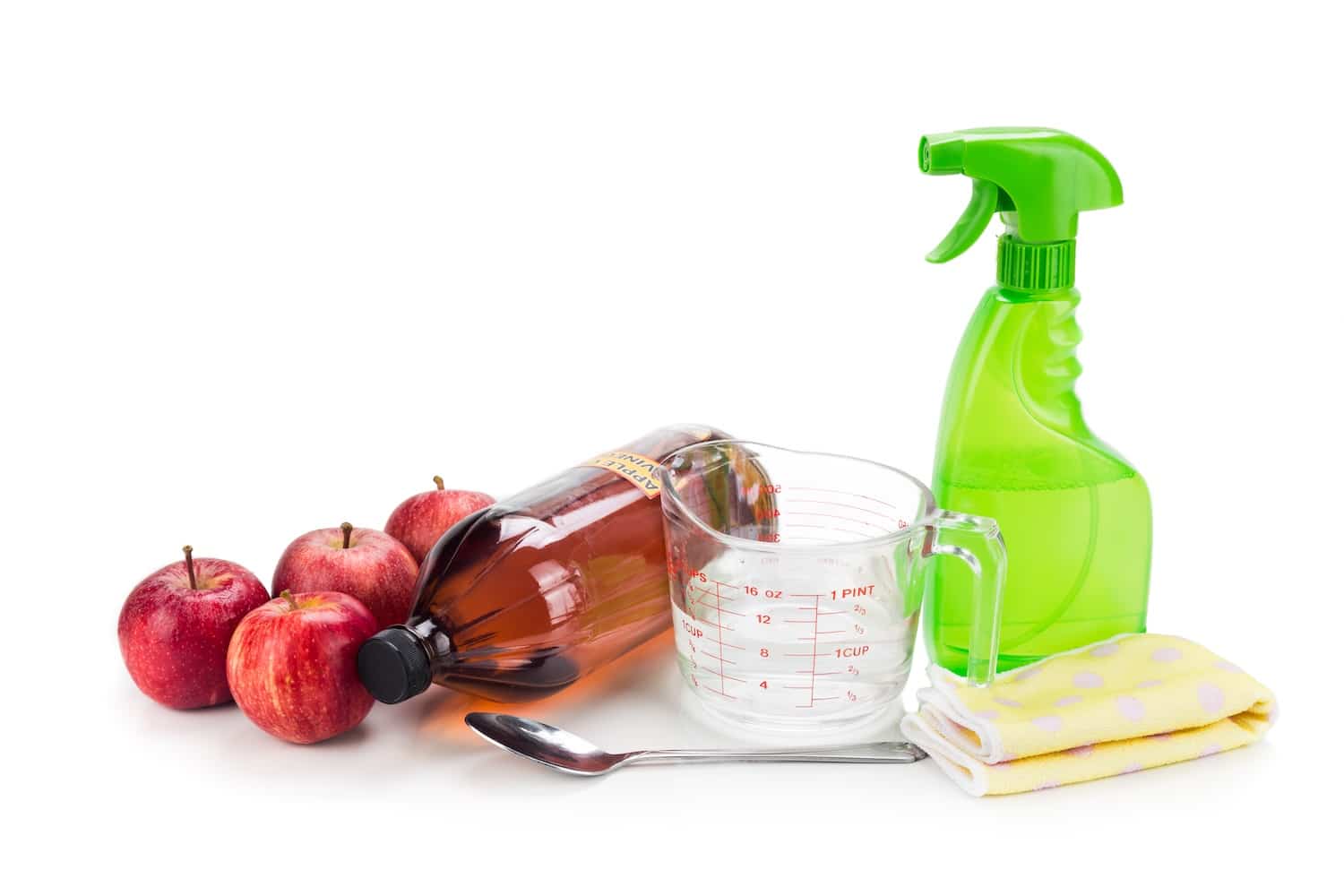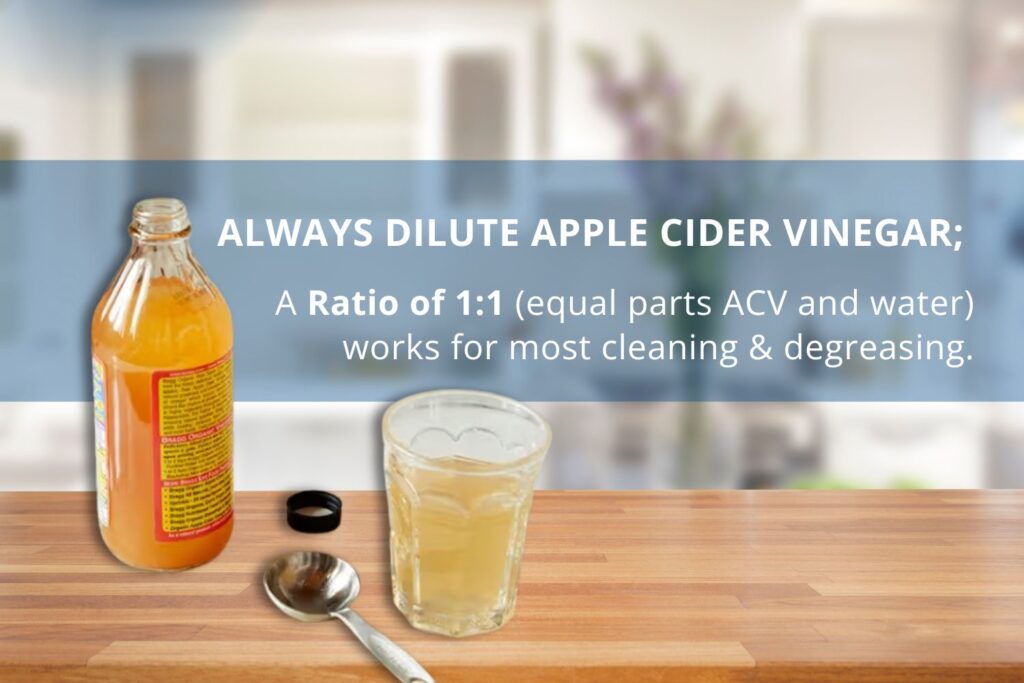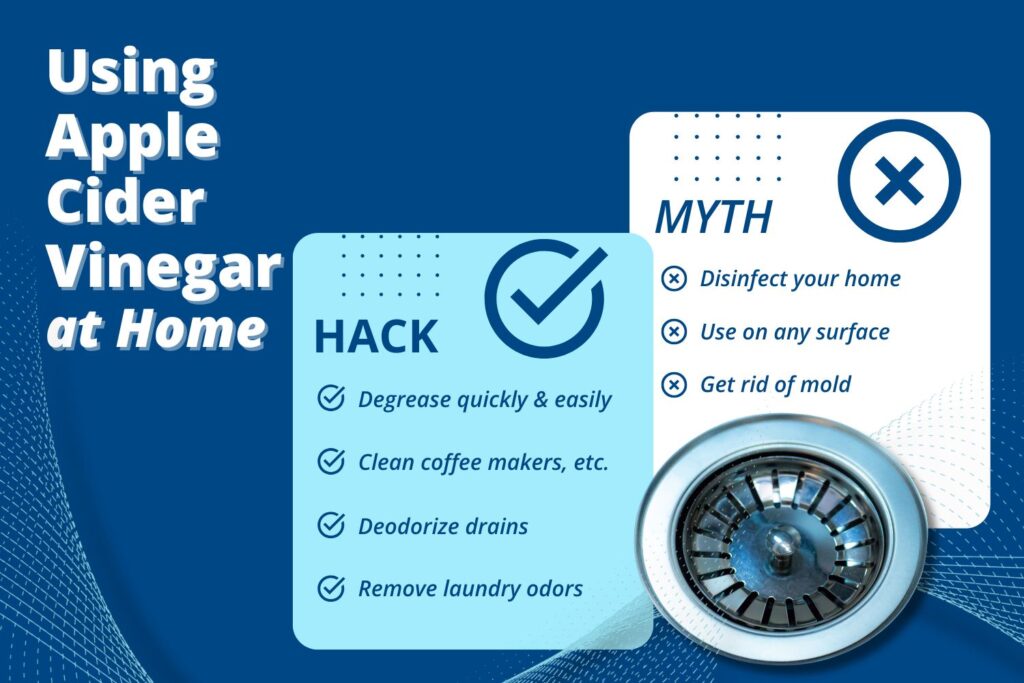
Apple cider vinegar is the kind of thing that shows up as a holy grail for cleaning, salad dressings, digestive supplements, and more. While it can be useful around the house, it’s not the miracle substance some people claim.
As inspectors, we see the real-life results of how people clean and care for their homes. Sometimes vinegar is helpful. Other times? It’s causing more damage than it’s solving. So let’s clear the air. Here are seven apple cider vinegar cleaning hacks and myths; when it works, when it doesn’t, and how to clean smart.
1) MYTH: It Disinfects Your Home
This is the internet’s favorite claim, but it’s not exactly true. Apple cider vinegar contains about 5% acetic acid, which can remove dirt and even kill some bacteria. But it’s not strong enough to disinfect surfaces in the way most homeowners think it does.
According to the CDC, proper disinfection means using an EPA-approved cleaner or a solution with at least 70% alcohol.
Bottom line: ACV is a decent degreaser. It’s not a germ killer. Don’t rely on it to sanitize your bathroom, kitchen, or places where raw food is prepped.

2) HACK: It Can Be a Great Degreaser
Apple cider vinegar cuts through grease better than plain water and doesn’t leave behind chemical residue. If your stovetop is sticky from last night’s dinner, a spray of vinegar and water (1:1) can help lift the grime.
Just let it sit for 5–10 minutes before wiping clean. Use a microfiber cloth for best results. Bonus: it leaves behind a fresher smell than most store-bought cleaners.
But don’t use it on:
- Unsealed wood
- Stone countertops
- Porous tile
These surfaces can react poorly to acids and may lose their finish.
3) MYTH: It’s Safe on All Surfaces
This is where vinegar gets risky. We’ve inspected homes with etched granite, warped hardwood, and discolored grout…all caused by improper cleaning.
Apple cider vinegar should never be used on:
- Marble or granite (it etches the stone)
- Hardwood floors (it can dull or strip the finish)
- Grout (especially if it hasn’t been sealed)
Cleaning damage isn’t always immediate. It happens slowly, until suddenly your surfaces don’t look clean, they look worn out. Replacing or refinishing can cost hundreds, even thousands of dollars.
4) HACK: Use It to Clean Coffee Makers and Faucets
Mineral deposits from hard water can build up in places like your coffee maker or around the edges of your faucets. Apple cider vinegar is great at breaking those down.
How to descale safely:
- Run a 1:1 mix of vinegar and water through your coffee maker (then two full water-only cycles).
- Soak faucet heads in a bag of vinegar tied with a rubber band for 30 minutes, then scrub with a soft brush.
Don’t use this method on stone sinks or antique finishes. And never mix vinegar with bleach. The chemical reaction can release toxic fumes.
5) MYTH: Vinegar Gets Rid of Mold
Not really. Vinegar might make mold look like it’s gone, but that doesn’t mean it is.
It can help clean small spots on non-porous surfaces, but it doesn’t penetrate drywall, wood, or insulation. Mold spreads through spores. If you’re only cleaning the surface, the real issue is likely still hiding behind your walls.
We’ve been called to inspect homes where mold came back again and again—all because the DIY treatment didn’t actually solve the problem. If you smell mildew or notice bubbling paint, soft drywall, or musty air, vinegar isn’t your fix. You need a mold inspection and professional remediation before it spreads.
6) HACK: Deodorize Drains Without Harsh Chemicals
Garbage disposal smell making you regret your dinner? Apple cider vinegar can help.
Here’s the trick:
- Pour ½ cup of baking soda into the drain.
- Follow with 1 cup warm ACV.
- Let it fizz for 10–15 minutes, then flush with hot water.
This won’t unclog your drain, but it does help neutralize smells and slow down grime buildup. Use it once a month for general upkeep.
If the smell keeps coming back, it could point to a deeper issue like trapped food, grease buildup, or even a venting problem in your plumbing.
7) HACK: Remove Laundry Odors Naturally
Forgot about that load in the washer? Don’t rewash; prerinse with ACV.
Add ½ cup of apple cider vinegar to the rinse cycle. It helps cut through mildew smells in towels, activewear, or anything left damp too long.
It’s extra useful in humid climates where musty smells settle in fast. But again, don’t combine it with bleach. That mix creates dangerous chlorine gas.

Other Maintenance Tips Worth Knowing
Apple cider vinegar is a helpful tool, but it can’t take the place of good home maintenance. Keep an eye out for:
- Peeling paint in bathrooms or basements
- Stains around vents or windows
- Warped floors or musty-smelling rooms
These might seem like small issues, but they’re often signs of deeper problems like hidden leaks, poor ventilation, or even early mold growth. Regular cleaning helps, but it’s only one piece of the puzzle.
When to Call in a Professional
Here’s the rule: if your cleaning efforts aren’t solving the problem, or something keeps coming back, it’s time to bring in a pro.
Lingering smells, strange stains, warped materials, or recurring mold are all signs that vinegar won’t cut it. At that point, you’re dealing with something deeper than dirt.
A home inspection from Boggs can pinpoint the cause, whether it’s a hidden leak, moisture intrusion, or something else entirely. That way, you don’t waste time chasing surface-level solutions.
Final Take
Using apple cider vinegar for cleaning can be smart, simple, and effective. But only in the right places, with the right expectations.
Don’t fall for every hack you see online. A vinegar wipe-down isn’t a substitute for disinfection, and it definitely isn’t a solution for mold issues. When your home needs more than a DIY, Boggs Inspection Services is here to help. Book your inspection today and get expert eyes on the problems vinegar can’t reach.



